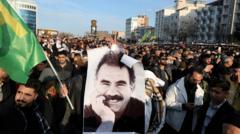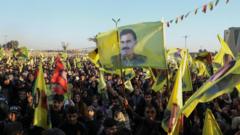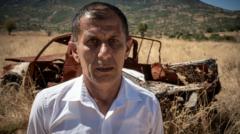In a historic shift, the PKK has confirmed its decision to lay down arms and disband, following a significant directive from its jailed leader, Abdullah Ocalan.
Kurdish PKK Announces Disbandment and Armistice Following Leader's Directive

Kurdish PKK Announces Disbandment and Armistice Following Leader's Directive
The outlawed group ends a 40-year insurgency in Turkey amid calls for democratic reform.
The outlawed Kurdish group known as the PKK has declared its intention to lay down arms and disband, marking a historic turning point after a 40-year-long insurgency against Turkey. This announcement comes after Abdullah Ocalan—leader of the PKK and currently imprisoned—urged the group to dissolve during a letter written in February. The PKK is designated as a terrorist organization in Turkey, as well as by the United States and the European Union.
Initially, the PKK sought an independent state for the Kurdish population, which comprises roughly 20% of Turkey's demographics. Over time, their objectives have shifted towards advocating for increased autonomy and rights for Kurds within Turkey. The protracted conflict has resulted in over 40,000 deaths and left a significant impact on Turkish society.
Ocalan, who has been held in solitary confinement since 1999, emphasized the importance of a democratic approach in addressing political aspirations. He stated, "there is no alternative to democracy in the pursuit and realization of a political system." While it remains uncertain what concessions may accompany the PKK's disbandment, speculation exists regarding the potential for Ocalan's parole and renewed political dialogue aimed at securing greater Kurdish rights.
Both the PKK and the Turkish government have vested interests in this development. The PKK has faced substantial military pressure from Turkey in recent years, alongside diminishing operational capability in neighboring regions of Iraq and Syria. Meanwhile, Turkish President Erdogan may require alliances with pro-Kurdish political entities in advance of the upcoming presidential elections in 2028.
A spokesperson for Erdogan’s AK Party praised the disbandment as a crucial measure towards establishing a "terror-free Turkey," with state institutions slated to oversee the process. However, Winthrop Rodgers, a researcher at the think tank Chatham House, cautioned that substantial democratic changes would be necessary to facilitate full Kurdish political participation. Some indications of "goodwill" from Turkish authorities have been observed, yet the extent to which this will translate into meaningful reforms remains uncertain. The situation leaves Turkey in a pivotal position regarding the future of its Kurdish population.
Initially, the PKK sought an independent state for the Kurdish population, which comprises roughly 20% of Turkey's demographics. Over time, their objectives have shifted towards advocating for increased autonomy and rights for Kurds within Turkey. The protracted conflict has resulted in over 40,000 deaths and left a significant impact on Turkish society.
Ocalan, who has been held in solitary confinement since 1999, emphasized the importance of a democratic approach in addressing political aspirations. He stated, "there is no alternative to democracy in the pursuit and realization of a political system." While it remains uncertain what concessions may accompany the PKK's disbandment, speculation exists regarding the potential for Ocalan's parole and renewed political dialogue aimed at securing greater Kurdish rights.
Both the PKK and the Turkish government have vested interests in this development. The PKK has faced substantial military pressure from Turkey in recent years, alongside diminishing operational capability in neighboring regions of Iraq and Syria. Meanwhile, Turkish President Erdogan may require alliances with pro-Kurdish political entities in advance of the upcoming presidential elections in 2028.
A spokesperson for Erdogan’s AK Party praised the disbandment as a crucial measure towards establishing a "terror-free Turkey," with state institutions slated to oversee the process. However, Winthrop Rodgers, a researcher at the think tank Chatham House, cautioned that substantial democratic changes would be necessary to facilitate full Kurdish political participation. Some indications of "goodwill" from Turkish authorities have been observed, yet the extent to which this will translate into meaningful reforms remains uncertain. The situation leaves Turkey in a pivotal position regarding the future of its Kurdish population.


















